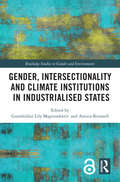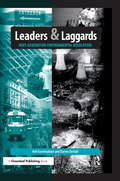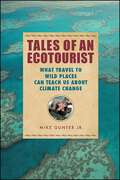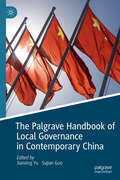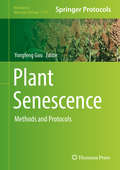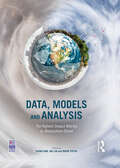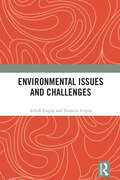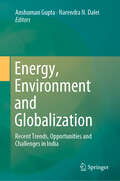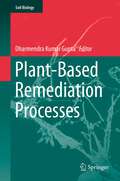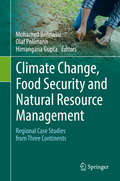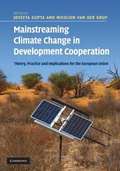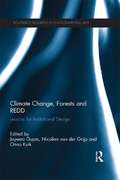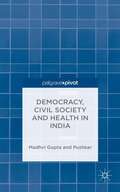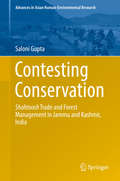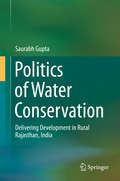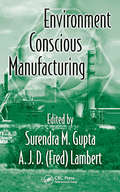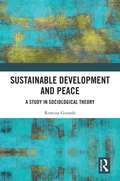- Table View
- List View
Michigan Shrubs and Vines: A Guide to Species of the Great Lakes Region
by Melanie Gunn Christopher Dick Burton V. BarnesShrubs and vines are some of the most diverse and widespread plants in the Great Lakes Region. Michigan Shrubs and Vines is the must-have book for anyone who wishes to identify and learn about these fascinating plants. Presented in the same attractive, easy-to-use format as the classic Michigan Trees, the book gives detailed descriptions of 132 species, providing concise information on key characters, habitat, distribution, and growth pattern. Precise line drawings accompany each species description and illustrate arrangement and characteristics of leaves, flowers, and fruits in addition to stem structure to assist with reliable year-round identification. A thorough introduction covers the features and forms of shrubs and vines as well as their natural history, their role in landscape ecosystems, and their occurrence in regional ecosystems of North America and plant communities of the Great Lakes. This long awaited companion to Michigan Trees will appeal to botanists, ecologists, students, and amateur naturalists alike.
Gender, Intersectionality and Climate Institutions in Industrialised States (Routledge Studies in Gender and Environments)
by Gunnhildur Lily Magnusdottir and Annica KronsellThis book explores how climate institutions in industrialized countries work to further the recognition of social differences and integrate this understanding in climate policy making. With contributions from a range of expert scholars in the field, this volume investigates policy-making in climate institutions from the perspective of power as it relates to gender. It also considers other intersecting social factors at different levels of governance, from the global to the local level and extending into climate-relevant sectors. The authors argue that a focus on climate institutions is important since they not only develop strategies and policies, they also (re)produce power relations, promote specific norms and values, and distribute resources. The chapters throughout draw on examples from various institutions including national ministries, transport and waste management authorities, and local authorities, as well as the European Union and the UNFCCC regime. Overall, this book demonstrates how feminist institutionalist theory and intersectionality approaches can contribute to an increased understanding of power relations and social differences in climate policy-making and in climate-relevant sectors in industrialized states. In doing so, it highlights the challenges of path dependencies, but also reveals opportunities for advancing gender equality, equity, and social justice. Gender, Intersectionality and Climate Institutions in Industrialized States will be of great interest to students and scholars of climate politics, international relations, gender studies and policy studies.
Leaders and Laggards: Next-Generation Environmental Regulation
by Neil Gunningham Darren SinclairConsensus is growing internationally that traditional command-and-control approaches to environmental regulation have borne much of their low-hanging fruit. Yet it is far from clear what should complement or replace them. Regulatory agencies and policy-makers are struggling with a lack of information about regulatory reform, about what works and what doesn't, and about how best to harness the resources of both government and non-government stakeholders. Progress is being impeded unnecessarily by a lack of shared knowledge of how similar agencies elsewhere are meeting similar challenges and by a lack of data on the success or otherwise of existing initiatives. Despite recent and valuable attempts to deal with such problems in the European Union and North America, these remain islands of wisdom in a sea of ignorance. For example, when it comes to dealing with small and medium-sized enterprises, very little is known, and what is known is not effectively distilled and disseminated. Much the same could be said about the roles of third parties, commercial and non-commercial, as surrogate regulators, and more broadly of many current initiatives to reconfigure the regulatory state. Based on the authors' work for the OECD, Victorian Environmental Protection Authority and the Western Australian Department of Environment Protection, Leaders and Laggards addresses these problems by identifying innovative regulatory best practice internationally in a number of specific contexts, evaluating empirically the effectiveness of regulatory reform and providing policy prescriptions that would better enable agencies to fulfil their regulatory missions. Focusing primarily on the differing requirements for both corporations and small and medium-sized enterprises in North America and Europe, the book aims to complement existing initiatives and to expand knowledge of regulatory reform by showing: how existing experience can best be put to practical use "on the ground"; by drawing lessons from experiments in innovative regulation internationally; by reporting and extrapolating on original case studies; and by advancing understanding on which instruments and strategies are likely to be of most value and why. The authors argue that the development of theory has outstripped its application. In essence, Leaders and Laggards aims to ground a myriad of theory on the reinvention of environmental regulation into practice. The book will be essential reading for environmental policy-makers, regulatory and other government officials responsible for policy design and implementation, academics and postgraduate students in environmental management, environmental law and environmental policy, and a more general readership within environmental policy and management studies. It will also be of interest to those in industry, such as environmental managers and corporate strategists, who are considering the use of more innovative environmental and regulatory strategies, and to environmental NGOs.
Climate Travels: How Ecotourism Changes Mindsets and Motivates Action
by Michael M. Gunter Jr.Many accounts of climate change depict disasters striking faraway places: melting ice caps, fearsome hurricanes, all-consuming fires. How can seeing the consequences of human impacts up close help us grasp how global warming affects us and our neighbors? This book is a travelogue that spotlights what a changing climate looks like on the local level—for wherever local happens to be.Michael M. Gunter, Jr. takes readers around the United States to bear witness to the many faces of the climate crisis. He argues that conscientious travel broadens understanding of climate change and makes its dangers concrete and immediate. Vivid vignettes explore the consequences for people and communities: sea level rise in Virginia, floods sweeping inland in Tennessee, Maine lobsters migrating away from American territorial waters, and imperiled ecosystems in national parks, from Alaskan permafrost to the Florida Keys. But Gunter finds inspiring initiatives to mitigate and adapt to these threats, including wind turbines in a tiny Texas town, green building construction in Kansas, and walkable urbanism in Portland, Oregon. These projects are already making a difference—and they underscore the importance of local action.Drawing on interviews with government officials, industry leaders, and alternative energy activists, Climate Travels emphasizes direct personal experience and the centrality of environmental justice. Showing how travel can help bring the reality of climate change home, it offers readers a hopeful message about how to take action on the local level themselves.
Tales of an Ecotourist: What Travel to Wild Places Can Teach Us about Climate Change (Excelsior Editions)
by Mike GunterCrossing the far corners of the globe, Tales of an Ecotourist showcases travel, from the hot and humid Amazon jungle to the frozen but dry Antarctic, as a simple yet spellbinding lens to better understand the complex issue of climate change. At its core, climate change is an issue few truly understand, in large part due to its dizzying array of scientific, economic, cultural, social, and political variables.Using both keen humor and memorable anecdotes, while weaving respected scientific studies along the way, Mike Gunter Jr. transports the reader to five famous ecodestinations, from the Galapagos Islands to the Great Barrier Reef, revealing firsthand the increasing threats of climate change. Part travelogue, part current events exposé, with a healthy dose of history, ecology, and politics, these tales of ecoadventure tackle such obstacles head on while fleshing out much-needed personal context to perhaps society's greatest threat of all.
Environmental Impacts of Shale Gas Development in China: Assessment and Regulation (SpringerBriefs in Geography)
by Meiyu Guo Jianliang WangThis book features a comprehensive analysis of the development of shale gas resources in China, with a focus on the potential environmental impacts that may result. China has the world’s largest shale gas resources, which it is keen to develop to alleviate air pollution and successfully transition to a low-carbon energy future. However, one significant obstacle standing between the ambition and reality is the potentially serious environmental impacts of shale gas production. This book offers a systematic assessment of these potential impacts, including the risk of water contamination, ecological disruption due to the huge consumption of water and methane leakage. It presents valuable first-hand data collected from the authors’ fieldwork in Sichuan and Chongqing and the latest information on China’s current shale gas operations and also includes a set of models and methods developed to quantify the impacts. It allows readers to gain a deeper understanding of environmental regulatory management systems regarding shale gas production in China by examining whether the existing monitoring, reporting and verification (MRV) systems and environmental regulations can effectively prevent adverse impacts from shale gas production. Providing a detailed study of shale gas development in China based on an unprecedented primary dataset, the book is a valuable resource for scholars, engineers and students who are interested in the energy development and environmental risks.
The Palgrave Handbook of Local Governance in Contemporary China
by Sujian Guo Jianxing YuThis Handbook provides a comprehensive overview of local governance in China, and offers original analysis of key factors underpinning trends in this field drawing on the expertise of scholars both inside and outside China. It explores and analyzes the dynamic interaction and collaboration among multiple governmental and non-governmental actors and social sectors with an interest in the conduct of public affairs to address horizontal challenges faced by the local government, society, economy, and civil community and considers key issues such as governance in urban and rural areas, the impact of technology on governance and related issues of education, healthcare, environment and energy.As the result of a global and interdisciplinary collaboration of leading experts, this Handbook offers a cutting-edge insight into the characteristics, challenges and trends of local governance and emphasizes the promotion of good governance and democratic development in China.
Plant Senescence
by Yongfeng GuoThis detailed volume covers a wide variety of techniques either developed specially for plant senescence studies or optimized for studying senescing plants. After an introduction to the topic, the book continues with sections on phenotypic analysis and molecular markers of plant organ senescence, hormonal control of plant senescence, stress-induced senescence, molecular and cellular processes in plant senescence, as well as systems biology approaches. Written for the highly successful Methods in Molecular Biology series format, chapters include introductions to their respective topics, lists of the necessary materials and reagents, step-by-step, readily reproducible laboratory protocols, and tips on troubleshooting and avoiding known pitfalls. Authoritative and practical, Plant Senescence: Methods and Protocols aims to provide a useful hand book of standard protocols for plant molecular biologists working on senescence.
Data, Models and Analysis: The Highest Impact Articles in 'Atmosphere-Ocean'
by Guoqi Han, Hai Lin and Douw SteynThis volume contains the ten most cited articles that have appeared in the journal Atmosphere-Ocean since 1995. These articles cover a wide range of topics in meteorology, climatology and oceanography. Modelling work is represented in five papers, covering global climate model development; a cumulus parameterization scheme for global climate models; development of a regional forecast modelling system and parameterization of peatland hydraulic processes for climate models. Data rehabilitation and compilation in order to support trend analysis work on comprehensive precipitation and temperature data sets is presented in four papers. Field studies are represented by a paper on the circumpolar lead system. While the modelling studies are global in their application and applicability, the data analysis and field study papers cover environments that are specifically, but not uniquely, Canadian. This book will be of interest to researchers, students and professionals in the various sub-fields of meteorology, oceanography and climate science.
Environmental Issues and Challenges
by Abhik Gupta Susmita GuptaThis book explores the field of environmental studies emphasizing its multidisciplinary nature. It looks at the fundamentals of environmental conservation and the management of sensitive ecosystems. The book provides an overview of the basic concepts used to understand and study diverse ecosystems and their functions as well as the progressively larger yet mutually inclusive units, such as the landscape and the biome. It examines the challenges towards preserving biodiversity which is under severe threat due to climate change, exploitation of natural resources, pollution, and man-made disasters. Besides outlining the causes and effects, the authors outline control mechanisms to keep pollution within safe limits and offer suggestions for resolving issues such as wildlife poaching and trade, water and air pollution, deforestation, and biodiversity loss through policy changes. This book will be of interest to the students, researchers, teachers of environmental studies, environmental science, sociology, political science, and public administration. This book will also be useful to environmentalists, wildlife conservationists, and policy makers.
Environmental Issues and Challenges
by Abhik Gupta Susmita GuptaThis book explores the field of environmental studies emphasizing its multidisciplinary nature. It looks at the fundamentals of environmental conservation and the management of sensitive ecosystems.The book provides an overview of the basic concepts used to understand and study diverse ecosystems and their functions as well as the progressively larger yet mutually inclusive units, such as the landscape and the biome. It examines the challenges towards preserving biodiversity which is under severe threat due to climate change, exploitation of natural resources, pollution, and man-made disasters. Besides outlining the causes and effects, the authors outline control mechanisms to keep pollution within safe limits and offer suggestions for resolving issues such as wildlife poaching and trade, water and air pollution, deforestation, and biodiversity loss through policy changes.This book will be of interest to the students, researchers, teachers of environmental studies, environmental science, sociology, political science, and public administration. This book will also be useful to environmentalists, wildlife conservationists, and policy makers.
Postcolonial Developments: Agriculture in the Making of Modern India
by Akhil GuptaThis definitive study brings together recent critiques of development and work in postcolonial studies to explore what the postcolonial condition has meant to rural people in the Third World. Focusing on local-level agricultural practices in India since the "green revolution" of the 1960s, Akhil Gupta challenges the dichotomy of "developed" and "underdeveloped," as well as the notion of a monolithic postcolonial condition. In so doing, he advances discussions of modernity in the Third World and offers a new model for future ethnographic scholarship. Based on fieldwork done in the village of Alipur in rural north India from the early 1980s through the 1990s, Postcolonial Developments examines development itself as a post-World War II sociopolitical ideological formation, critiques related policies, and explores the various uses of the concept of the "indigenous" in several discursive contexts. Gupta begins with an analysis of the connections and conflicts between the world food economy, transnational capital, and technological innovations in wheat production. He then examines narratives of village politics in Alipur to show how certain discourses influenced governmental policies on the green revolution. Drawing links between village life, national trends, and global forces, Gupta concludes with a discussion of the implications of environmentalism as exemplified by the Rio Earth Summit and an examination of how global environmental treaties may detrimentally affect the lives of subaltern peoples. With a series of subtle observations on rural politics, nationalism, gender, modernization, and difference, this innovative study capitalizes on many different disciplines: anthropology, sociology, comparative politics, cultural geography, ecology, political science, agricultural economics, and history.
Energy, Environment and Globalization: Recent Trends, Opportunities and Challenges in India
by Anshuman Gupta Narendra N. DaleiThis book analyzes contemporary issues relating to energy, environment, and globalization in the Indian context. As a signatory to the Paris climate accord, India has reiterated its commitment to taking strong and positive steps toward climate change mitigation. However, as one of the fastest growing economies in the world, it is battling the effects of a steep rise in fossil fuel usage and pollution. Further, increasing globalization is leading to greater economic activity and production, resulting in additional energy use, which has a negative effect on the environment. The book argues that globalization need not have only a negative environmental impact; it can also have positive impact through the importation of environmentally sound technologies and implementing global compliance standards. The book is divided into three sections: The energy section discusses issues relating to the status of Indian natural gas market and the need for developing an efficient gas market in India; the economics and politics of sustainable energy in India; the challenges of thermal power and significance of clean thermal power generation in India; environmental and policy issues concerning energy use in urban India; the importance of energy use in developing Human Development Index (HDI); and issues relating to renewable energy in India. The environment section then examines topics such as the impact of global warming on local weather by examining the frequency of extreme weather events such as drought and floods, and their impact on farming activities in the Indian state of Odisha; the importance of according the economic value to environmentally significant things like national park , mangroves, etc. for sustainable development; the role of environmental accounting for ecological sustainability and ecotourism; and environmental concerns increasingly gaining traction among the corporate sector for their long-run benefits . Lastly, the third section addresses issues relating to the challenges and opportunities of globalization, such as the interface between globalization and environment; managing India’s business interest in proposing new Bilateral Investment Treaty (BIT); the challenges being faced by Indian exports and their revival; and making Indian SMEs competitive. As such, it is an invaluable resource for policymakers, researchers, practitioners and students in the field of energy, environment and trade economics.
Plant-Based Remediation Processes
by Dharmendra Kumar GuptaPhytoremediation is an emerging technology that employs higher plants for the clean-up of contaminated environments. Basic and applied research have unequivocally demonstrated that selected plant species possess the genetic potential to accumulate, degrade, metabolize and immobilize a wide range of contaminants. The main focus of this volume is on the recent advances of technologies using green plants for remediation of various metals and metalloids. Topics include biomonitoring of heavy metal pollution, amendments of higher uptake of toxic metals, transport of heavy metals in plants, and toxicity mechanisms. Further chapters discuss agro-technological methods for minimizing pollution while improving soil quality, transgenic approaches to heavy metal remediation and present protocols for metal remediation via in vitro root cultures.
Climate Change, Food Security and Natural Resource Management: Regional Case Studies from Three Continents
by Himangana Gupta Olaf Pollmann Mohamed BehnassiThis book contributes to the on-going debates on climate change by focusing on the SDGs and exploring linkages between environmental change and food security as well as the relevance and need to consider the management of natural resources, especially water, soil and forest. Compared to relevant existing publications, this book covers case studies that capture the everyday realities of the local people and how they react and adapt to similar situations in different geographical settings. Each case study presented in this book gives a particular message. The strength of this book lies in the fact that it covers the most neglected topics in climate negotiations in spite of the fact that these decide the fate of millions of people around the world, especially the developing countries. By presenting a collection of case studies from Africa, Asia and Europe, this book encourages cross-continental knowledge sharing. The scope of the book ranges from impacts to mitigation and from in-field experiments to policy implementation. It contributes to the existing knowledge on climate-food nexus and connects climate change to sectors it could impact directly. All chapters in this book emphasise local ownership of strategy processes, effective participation from all levels, and high-level commitment. Besides being relevant for the academicians and scholars working in the field of climate change, forest and agriculture, it aims to catch interest of the policy makers and practitioners to understand ground realities for appropriate action. It is also bound to make an impact on the Non-Governmental Organizations around the world and in the three different continents that this book covers, considering the indigenous and local issues highlighted in this book.
A Green Day: Embracing Climate Action
by Jeevesh Gupta Chittranjan Dubey Anandajit GoswamiAn Engaging Compilation of Perspectives on Climate Activism The impassioned essays, noteworthy profiles and first-person narratives in this anthology champion grassroots and global environmental movements that have persuaded policymakers and mobilized communities to take note of the worsening state of the natural order. From the Global South to the Global North, change advocates and those experiencing the thick of the emergency revisit the tipping points in their activism journey, lay out harsh truths about the extent of damage caused and offer scalable solutions to combat the mounting crisis. Outlining their rage, despair, fears and hope for the future, the campaigners underscore that there may be reasons to be optimistic despite the dreary reality we find ourselves in. While calling for collective action, these wide-ranging, inspiring and urgent stories reflect a diverse landscape of climate activism and are enough evidence that a sea change is possible.
The History of Global Climate Governance
by Joyeeta GuptaWhat has happened globally on the climate change issue? How have countries' positions differed over time, and why? How are problems and politics developing on an increasingly globalised planet, and can we find a solution? This book explores these questions and more, explaining the key underlying issues of the conflicts between international blocs. The negotiation history is systematically presented in five phases, demonstrating the evolution of decision-making. The book discusses the coalitions, actors and potential role of the judiciary, as well as human rights issues in addressing the climate change problem. It argues for a methodical solution through global law and constitutionalism, which could provide the quantum jump needed in addressing the problem of climate governance. This fascinating and accessible account will be a key resource for policymakers and NGOs, and also for researchers and graduate students in climate policy, geopolitics, climate change, environmental policy and law, and international relations.
Mainstreaming Climate Change in Development Cooperation
by Joyeeta Gupta Nicolien van der GrijpClimate change, development and development cooperation are, individually and jointly, three politically sensitive, complex issues, especially in the context of relations between developed and developing countries. This book tackles these issues by combining theoretical, political, and practical perspectives, analysing the dominant paradigms and exploring the meaning of the concept of mainstreaming. At the practical level, it presents the results of case studies focusing on assistance provided by the European Union and key member states and the climate needs articulated by developing countries. At the political level, it highlights the sensitivities between developed and developing countries and examines the mainstreaming debate in various fora. This book is valuable for policymakers, academics, politicians and non-state actors working in the fields of development studies, international law, politics, international relations, economics, climate change, and environmental studies.
Climate Change, Forests and REDD: Lessons for Institutional Design (Routledge Research in International Environmental Law)
by Joyeeta Gupta Nicolien van der Grijp Onno KuikA search for new methods for dealing with climate change led to the identification of forest maintenance as a potential policy option that could cost-effectively reduce greenhouse gas emissions, with the development of measures for Reducing Emissions from Deforestation and Forest Degradation (REDD). This book explores how an analysis of past forest governance patterns from the global through to the local level, can help us to build institutions which more effectively deal with forests within the climate change regime. The book assesses the options for reducing emissions from deforestation in developing countries under the international climate regime, as well as the incentives flowing from them at the national and sub national level and examines how these policy levers change human behaviour and interface with the drivers and pressures of land use change in tropical forests. The book considers the trade-offs between certain forestry related policies within the current climate regime and the larger goal of sustainable forestry. Based on an assessment of existing multi-level institutional forestry arrangements, the book questions how policy frameworks can be better designed in order to effectively and equitably govern the challenges of deforestation and land degradation under the global climate change regime. This book will be of particular interest to students and scholars of Law and Environmental Studies.
Democracy, Civil Society, and Health in India
by Madhvi Gupta PushkarIndia's health failures remain visible and pronounced despite high rates of economic growth since the 1980s and more than six decades of democratic rule. The authors address the key issues that emerge from the country's health situation, speculating on what it will take for low-income groups to begin claiming for better social services
Step Wise Protocols for Somatic Embryogenesis of Important Woody Plants: Volume I (Forestry Sciences Ser. #84)
by Pramod Gupta Shri Mohan JainWorld population is increasing at an alarming rate and this has resulted in increasing tremendously the demand for tree products such as wood for construction materials, fuel and paper, fruits, oils and medicines etc. This has put immense pressure on the world’s supplies of trees and raw material to industry and will continue to do so as long as human population continues to grow. Also, the quality of human diet, especially nutritional components, is adversely affected due to limited genetic improvement of most of fruit trees. Thus there is an immediate need to increase productivity of trees. Improvement has been made through conventional breeding methods, however, conventional breeding is very slow due to long life cycle of trees. A basic strategy in tree improvement is to capture genetic gain through clonal propagation. Clonal propagation via organogenesis is being used for the production of selected elite individual trees. However, the methods are labour intensive, costly, and produce low volumes. Genetic gain can now be captured through somatic embryogenesis. Formation of embryos from somatic cells by a process resembling zygotic embryogenesis is one of the most important features of plants. In 1958, Reinert in Germany and Steward in USA independently reported somatic embryogenesis in carrot cultures. Since then, tremendous progress in somatic embryogenesis of woody and non-woody plants has taken place. It offers a potentially large-scale propagation system for superior clones.
Contesting Conservation
by Saloni GuptaThis book explores today’s changing intellectual climate, wherein understanding politics at different levels from global to local is considered mandatory in order to appraise the outcome of nature conservation interventions. By carefully examining two such processes – the ban on shahtoosh trade and the ‘National Afforestation Programme’ in the Indian state of Jammu and Kashmir, the book reveals how these processes are influenced by politics at different levels – from their introduction at the macro-level to their implementation at the micro-level – and in turn become coloured by the agendas and interests of the various stakeholders involved. Throughout the book, one priority is to give a voice to the poor resource-users who have been traditionally dependent on wildlife and forest resources for mere subsistence. Yet, these same people are who bear the brunt of nature conservation costs, rather than those actors who are responsible for the most serious violations in pursuit of greater profits. Contemporary Environmental Sociology is chiefly characterised by its focus on power relations in resource conservation and management. In ‘political ecology’ literature, too – especially after recognising the paradoxes and limitations of approaches such as ‘sustainable development’, ‘sustainable livelihoods’ and ‘community based natural resource management’ – there is a growing concern for critical analyses of multi-level politics in connection with nature conservation. The purpose of the book is not to challenge the gravity of environmental concerns, but to question the dominance of conservation interests over the subsistence needs of local communities, and to strike a balance between environmental and social justice. It argues that, unless and until more just accountability for the affected populations is ensured, conservation policies are unlikely to meet the goals of sustainable resource management. Given its critical engagement with human-nature conflicts in Jammu and Kashmir, the book offers a unique resource for students and scholars of Environmental Sociology, Political Ecology, Natural Resources Management, Conflict Studies and Human Rights Studies.
Politics of Water Conservation
by Saurabh GuptaThis book examines the politics of rural development with special reference to watershed development interventions in the desert province of Rajasthan in India. Watershed development (and rainwater harvesting) is one of the most significant rural development interventions in rainfed areas of India since the early 1990s. A range of developmental actors including the state watershed department, international donors, NGOs and grassroots organisations are involved in sponsoring watershed development projects. Using multi-sited ethnography and conversational interviews with the deliverers as well as recipients of development, the book compares and contrasts the watershed interventions of the state and two different kinds of NGOs in Rajasthan. While conventional studies on watershed development have focused on the evaluation of 'success' or 'failure' of particular projects, whether implemented by the state or NGOs, the book moves beyond this narrow analytical gaze to look at the roles, agendas and interests of multiple development agencies, often partnering together and sometimes competing with each other as part of, what the author calls, the 'watershed development regime'. Taking cue from watershed development and water conservation projects over the last two decades, the book engages with the larger question of 'how' of delivering development. It examines the complex processes of cooperation, competition, negotiations, contestations and conflicts between different stakeholders, including the agents of development and differently positioned rural social groups in the context of Rajasthan. The book demonstrates that the recent interventions in watershed development and rainwater harvesting have considerably shaped the politics of development in Rajasthan in a number of ways: by becoming a site for the remaking of the 'state' and its internal relations, by disturbing the local hegemony in the countryside, by creating new relations of patronage between diverse agents and recipients of development, by increasing the associational capacity as well as creating new conflicts (intra and inter village) and by initiating competition and cooperation between the various agents of development over control of local resources and power.
Environment Conscious Manufacturing
by Surendra M. Gupta A. J. D. Fred LambertHotter temperatures, less arctic ice, loss of habitat-every other day, it seems, global warming and environmental issues make headlines. Consumer-driven environmental awareness combined with stricter recycling regulations have put the pressure on companies to produce and dispose of products in an environmentally responsible manner. Redefining indus
Sustainable Development and Peace: A Study in Sociological Theory
by Romina GurashiThis book explores the growing attention that sociology has started to give to environmental issues in terms of peace and social justice. With a focus on sociological theory and its development, it reconstructs the long journey made by the social sciences towards the reconstruction, in a single theoretical paradigm, of the problems associated with the implementation of conditions of peace and sustainability. Beginning from the premise that environmental issues are never purely environmental, but entail political, economic and social implications, Sustainable Development and Peace offers an understanding of where we are heading and how, reflecting on present challenges and possible directions for the future. It will, therefore, appeal to scholars of sociology, social theory, development studies, politics and environmental studies.

